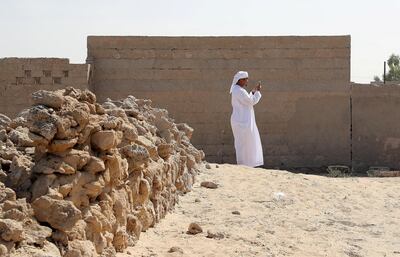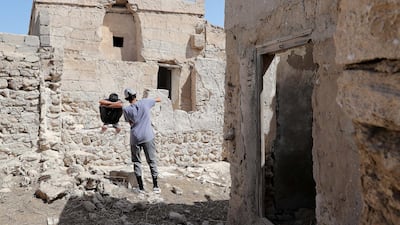Perhaps they are troublemakers, perhaps a hot temper has seen them bounce from one playground fight to another, but a group of difficult male students from one Ras al Kaimah school have been learning to see life from a different angle through a photography workshop.
The class is part of the Hands on Learning pilot program, which has been running at Saeed bin Jubair Boys Secondary School since 2014. The scheme was launched by the Sheikh Saud bin Saqr Al Qasimi Foundation for Policy Research in response to a 2013 study on male student dropouts in the UAE.
The research found a combination of negative school factors playing a large role in students’ decision to skip classes and ultimately drop out of school. Risk factors include a low socio-economic background, poorly educated or uninvolved parents and de-motivating school experiences marked by unsupportive teachers and disruptive peers.
Between 2006 and 2007 in RAK, the last study that figures are available for, which was conducted by Dr Natasha Ridge, executive director of the foundation, 14 per cent of boys had dropped out of school compared to 2.5 per cent of girls.
The pilot scheme seeks to re-engaged those at risk from dropping out through a learning programme that creates a safe and comfortable environment and gets them actively involved in hands-on classes that have so far included building, landscaping, renovation and art projects. Eleven students between 14 and 18 from the school took part on this latest class, which was also part of the sixth annual Ras Al Khaimah Fine Arts Festival.

The students spend one day each week in the HoL classroom located in the school. Guy Brooksbank, an American photographer who is an Honorary Guest Artist at the festival, this week taught students how to take better photos with their mobile phones.
“They did not only learn how to take photos but also they learned how to be patient, find inspiration, see things from a different angle, seize the moment and explore their culture in a different way,” said Mr Brooksbank.
The program is also designed to help the teenagers develop critical life skills such as collaboration, leadership, problem solving, resilience, communication and empathy.
“We try to connect what they take in school with real life to clarify why it’s important to attend school and be educated, as well as help them to become more organised, improve their self-esteem, be more productive and creative, enjoy learning and achieve success at school,” said Sahar El Asad, research associate at the Foundation.
During the class meetings, students are self-directed and encouraged to be creative, thinking of their own ways to build meaningful projects that can serve them, their schools and their communities
“[The students] are the troublemakers at school, they used to fight with their peers and teachers so we try to reengage them in school,” said Ms El Asad.
Dr Ridge told The National that the programme works to address this disengagement.
"Essentially, boys in public secondary school feel demotivated as they do not see how school links to their future life and because lessons are very academic with very little practical components," she said.
"Often they check out mentally from school early on in secondary school and then start acting up and causing trouble, often to hide the fact that they don't really understand what is going on or because they see no point to it.
The programme, she said, pushes them to take responsibility for their own behaviour and to address the mindsets that might be holding them back, "whether that be constantly arguing with teachers or being very shy or looking for conflict and holding grudges against other students".

"We also emphasize life skills such as cooking and cleaning and understanding healthy eating and why it is important for life," she said.
According to Dr Ridge, nearly all of the students emerge from the program engaged and ready to go places, such as university, which they had never even considered before.
"We also teach them English so that they will be confident in broader society and more able to get a job later on," she said.
The foundation is still fine-tuning the program and working on coming up with an affordable, sustainable model that can be easily replicated and rolled out across the country.
"In particular, the program hinges heavily upon having an artisan teacher who can teach the boys trade skills and a guidance counselor who works with them on the soft skills part of the program," said Dr Ridge.
This week's workshop also included a field trip to the historic Jazirat Al Hamra fishing village where the students had the chance to take pictures of a 17th century archaeological site.
_____________
Read more:
Parents voice anger as Abu Dhabi school hit by deafening construction noise
_____________
“This is the first time I have visited this place and its very old and unique. The workshop made me look at the things around me in a different way and focus on the small details,” said Ahmad Al Bloushi, 14, a student in the programme.
“I joined the programme this year and I learned so many things. I found out that I love farming and seeing the plants grow. It helped me concentrate more in school and encouraged me to be more focused and organised,” he said.
“When I grow up I want to be an architect to help in building the country and serve the community."
Another student, Khalifa Al Ghafiri, 17, said that he would like to become an instructor in the programme in order to encourage other students and help them in achieving high grades.
“I joined the programme in 2015, and I learned how to respect others, take responsibility and be patient. These skills have helped me become a better person and achieve more in life and school.”

